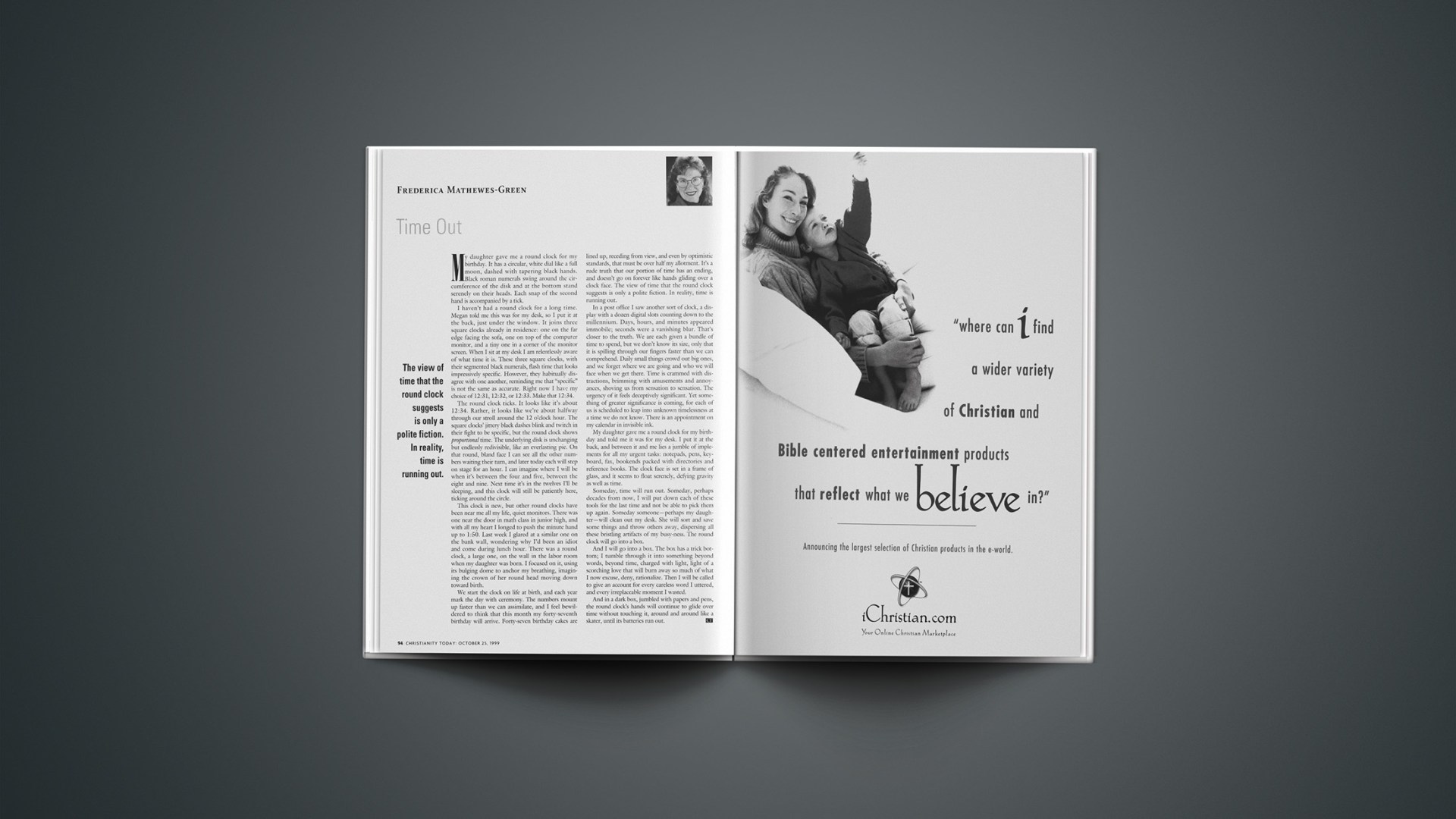My daughter gave me a round clock for my birthday. It has a circular, white dial like a full moon, dashed with tapering black hands. Black roman numerals swing around the circumference of the disk and at the bottom stand serenely on their heads. Each snap of the second hand is accompanied by a tick.
I haven’t had a round clock for a long time. Megan told me this was for my desk, so I put it at the back, just under the window. It joins three square clocks already in residence: one on the far edge facing the sofa, one on top of the computer monitor, and a tiny one in a corner of the monitor screen. When I sit at my desk I am relentlessly aware of what time it is. These three square clocks, with their segmented black numerals, flash time that looks impressively specific. However, they habitually disagree with one another, reminding me that “specific” is not the same as accurate. Right now I have my choice of 12:31, 12:32, or 12:33. Make that 12:34.
The round clock ticks. It looks like it’s about 12:34. Rather, it looks like we’re about halfway through our stroll around the 12 o’clock hour. The square clocks’ jittery black dashes blink and twitch in their fight to be specific, but the round clock shows proportional time. The underlying disk is unchanging but endlessly redivisible, like an everlasting pie. On that round, bland face I can see all the other numbers waiting their turn, and later today each will step on stage for an hour. I can imagine where I will be when it’s between the four and five, between the eight and nine. Next time it’s in the twelves I’ll be sleeping, and this clock will still be patiently here, ticking around the circle.
This clock is new, but other round clocks have been near me all my life, quiet monitors. There was one near the door in math class in junior high, and with all my heart I longed to push the minute hand up to 1:50. Last week I glared at a similar one on the bank wall, wondering why I’d been an idiot and come during lunch hour. There was a round clock, a large one, on the wall in the labor room when my daughter was born. I focused on it, using its bulging dome to anchor my breathing, imagining the crown of her round head moving down toward birth.
We start the clock on life at birth, and each year mark the day with ceremony. The numbers mount up faster than we can assimilate, and I feel bewildered to think that this month my forty-seventh birthday will arrive. Forty-seven birthday cakes are lined up, receding from view, and even by optimistic standards, that must be over half my allotment. It’s a rude truth that our portion of time has an ending, and doesn’t go on forever like hands gliding over a clock face. The view of time that the round clock suggests is only a polite fiction. In reality, time is running out.
In a post office I saw another sort of clock, a display with a dozen digital slots counting down to the millennium. Days, hours, and minutes appeared immobile; seconds were a vanishing blur. That’s closer to the truth. We are each given a bundle of time to spend, but we don’t know its size, only that it is spilling through our fingers faster than we can comprehend. Daily small things crowd out big ones, and we forget where we are going and who we will face when we get there. Time is crammed with distractions, brimming with amusements and annoyances, shoving us from sensation to sensation. The urgency of it feels deceptively significant. Yet something of greater significance is coming, for each of us is scheduled to leap into unknown timelessness at a time we do not know. There is an appointment on my calendar in invisible ink.
My daughter gave me a round clock for my birthday and told me it was for my desk. I put it at the back, and between it and me lies a jumble of implements for all my urgent tasks: notepads, pens, keyboard, fax, bookends packed with directories and reference books. The clock face is set in a frame of glass, and it seems to float serenely, defying gravity as well as time.
Someday, time will run out. Someday, perhaps decades from now, I will put down each of these tools for the last time and not be able to pick them up again. Someday someone—perhaps my daughter—will clean out my desk. She will sort and save some things and throw others away, dispersing all these bristling artifacts of my busy-ness. The round clock will go into a box.
And I will go into a box. The box has a trick bottom; I tumble through it into something beyond words, beyond time, charged with light, light of a scorching love that will burn away so much of what I now excuse, deny, rationalize. Then I will be called to give an account for every careless word I uttered, and every irreplaceable moment I wasted.
And in a dark box, jumbled with papers and pens, the round clock’s hands will continue to glide over time without touching it, around and around like a skater, until its batteries run out.
Copyright © 1999 Christianity Today. Click for reprint information.










